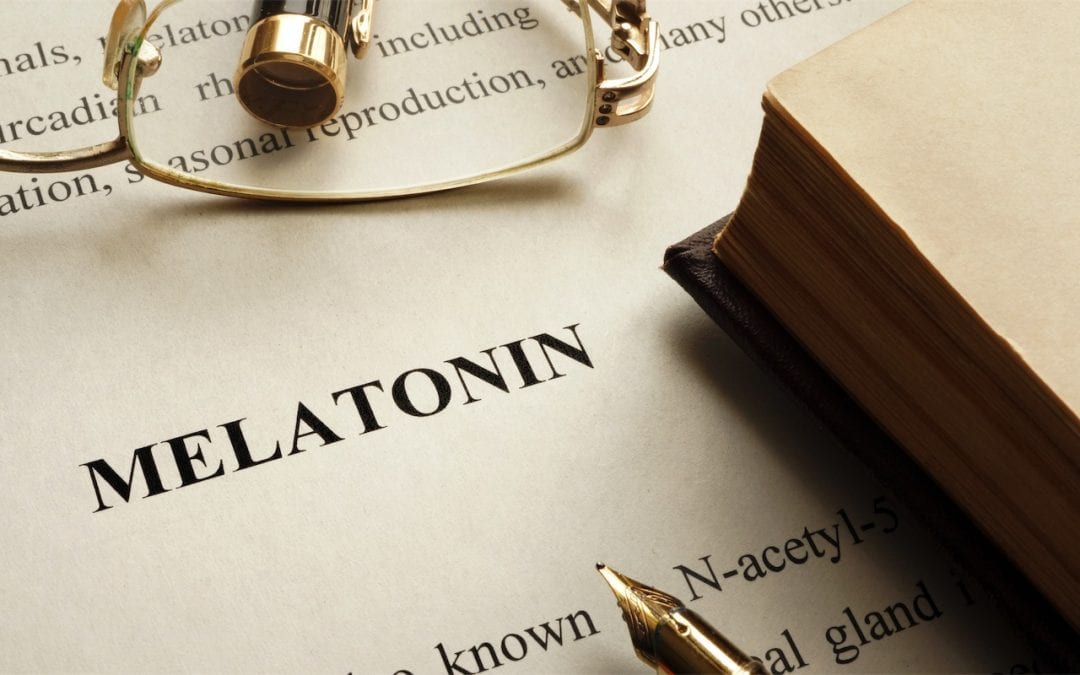If you are having problems sleeping and you visit your GP, you may be prescribed melatonin. However, this may not be your first class ticket to the land of nod. Melatonin will only help you sleep if your sleep issues are caused by not having enough or not releasing it at the right time.
What is melatonin?
Melatonin is a hormone often referred to as the “vampire” hormone, or the hormone of darkness because the levels rise once it gets dark and it stops working when you are exposed to light, both natural and artificial.
It is produced in the pineal gland; a pine-cone shaped endocrine gland about the size of a grain of rice located in your brain. The pineal gland is inactive during the day, but once the lights go down, it really ramps up production.
The most important thing to consider when using melatonin is that it is not a sedative. Melatonin is a regulator of the sleep/wake cycle or circadian rhythm. It helps adjust your body clock by inhibiting the functions that keep you awake. It resets your brain’s perception of when it will sleep and slightly lowers your core body temperature making you feel less alert. This means that it is more applicable to sleep disorders involving dysregulation of the circadian rhythm. If your insomnia is due to medication side effects, nutritional deficiencies or mood disorders among other things melatonin may not be the most effective treatment for you.
Where do I get melatonin?
In Australia, you require a prescription from your doctor before taking melatonin. However, the regulations are different in America and Europe, and you may be able to purchase melatonin over the counter there. The products in health food stores in Australia will be a homoeopathic preparation.
Who can benefit from melatonin?
People who are having issues sleep problems related to circadian rhythm disruption get the best results from using melatonin. This includes
- Jetlag
- Shift work sleep disorders
- Delayed sleep phase disorder
- Sleep problems in the elderly
Supporting your natural melatonin
As a Naturopath, I can’t prescribe supplemental melatonin so the remainder of this article will be a discussion about ways your can increase and support your natural production.
Problems with natural melatonin occur for two reasons: your body is not making enough, or you’re not releasing sufficient qualities of it at night.
Why you may not be making enough
- Melatonin production declines with age. A 70-year-old will have around a third of the output of a teenager.
- Lack of nutrients; the building blocks of melatonin are tryptophan, B group vitamins, magnesium and zinc. If your diet doesn’t have adequate supplies of these nutrients, you may struggle to make enough.
- You may have an adequate diet, but nutrients are getting mugged by medications including corticosteroids, proton pump inhibitors, and metformin.
- Vitamin B3 is particularly important to the neurotransmitter serotonin a precursor to melatonin. If you have increased requirements for B3 such as high consumption of alcohol, high cholesterol, high sugar diet, stress, parasite or fungal infections, the amino acid tryptophan will be shunted away from making serotonin to making B3. Symptoms of this include low mood, sugar cravings, problems going to sleep and feeling angry.
- Rare medical conditions pineal gland including tumours and cysts.
Why you might not be releasing enough
- Exposure to artificial light at night and not enough exposure to the sun during the day. To set your circadian rhythm your brain needs light signals, so it knows where it is. Getting exposure to some early morning, midday and sunset for as little as 10 minutes each day can help entrain your body clock. The blue light from screens, LED and fluorescent light at night can all delay the release of melatonin. At least an hour before bed dim the lights and shut down the laptop, phone and tablets so your melatonin can come out to play.
- Ongoing, low-grade stress releases cortisol. Cortisol is the enemy of melatonin. Your ideal natural cortisol rhythm is for it to be high in the morning – giving you the getup and go and then it should taper off in the evening and remain low overnight. Modern lifestyles often result in cortisol not dropping sufficiently overnight to let melatonin work its magic.
Tips to support your melatonin
- Consume a nutrient dense whole foods diet with a wide variety of seasonal produce.
- Include foods with melatonin in your diet – sour cherry (juice but not dried), goji berries, raspberries, tomato and almonds. Sour cherry was found to have more beneficial in an older age group.
- Reduce you alcohol consumption
- Regulate circadian clock – get exposure to early morning, midday and sunset.
- Dim light at night and stay away from your screens at least one hour before bed
- Manage stress – develop a “wind down” routine to close off your day.
- Meditate – regular meditators have been found to have three times the level of melatonin than non-meditators. It will also help you manage stress.
I hope that has helped you learn more about the benefits of melatonin. If you’ve got any questions or thoughts about melatonin, please comment below.
If you enjoyed this article you might also like:
Four Reasons a Daily meditation practice will help you to sleep better
Sleep hygiene as part of your everyday routine

Need help with your sleep?
Norelle Hentschel is an experienced Naturopath with a clinic in Stones Corner, Brisbane who enjoys supporting her clients to reach their health goals.
Want more articles like this?
Receive a monthly digest of natural health information to help you become “health” sufficient!
PS. Your inbox real estate is precious, and we will never annoy you with sales pitches or share your details with anyone else. One email a month — that’s it.

